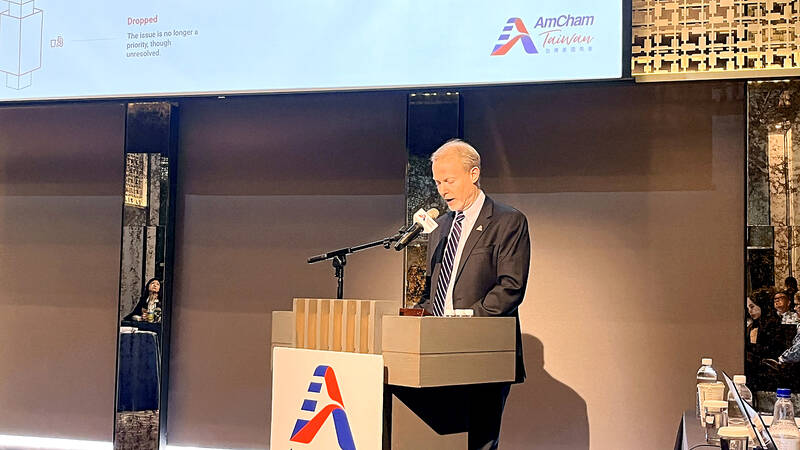The American Chamber of Commerce in Taiwan (AmCham Taiwan) yesterday called on the US government to remove new and proposed tariffs on Taiwanese goods, arguing that the measures unfairly penalize a trusted democratic partner.
“Maintaining tariffs on semiconductors, advanced machinery, and electronics raises costs for American businesses and consumers, while sending a conflicting signal about the strength of US-Taiwan ties,” the chamber said upon launching its annual white paper in Taipei.
The most influential international business organization in Taiwan, with about 1,200 members from more than 580 companies, urged Washington to align tariff policy with the strategic goal of reinforcing industrial competitiveness and trusted economic partnerships.

Photo: Liao Chia-ning, Taipei Times
US President Donald Trump’s administration on April 2 slapped a 32 percent tariff on Taiwanese goods and announced a 90-day delay one week later, but has kept in place a 10 percent universal tariff.
AmCham Taiwan highlighted the expanding contributions Taiwan has made to US economic and strategic interests.
The paper also pointed out that Taiwan is one of the most reliable and high-performing partners of the US, and plays an indispensable role in upholding peace and stability in the Indo-Pacific region.
The chamber urged the US government to maintain strong bipartisan support for Taiwan’s defense, ensure timely delivery of arms packages and enable greater integration of Taiwanese companies into US defense supply chains.
The body further encouraged the resumption of high-level Cabinet visits to Taiwan to advance meaningful cooperation in areas such as trade, energy and healthcare.
With the prospect of a long-awaited US-Taiwan double taxation agreement closer than ever, the chamber underscored the urgency of resolving the long-standing issue.
“The absence of such an agreement continues to constrain Taiwanese investment in US manufacturing, especially among companies in the semiconductor supply chain seeking to expand their American operations,” the paper said.
AmCham Taiwan also urged Washington to support Taiwan’s participation in international organizations where full statehood is not a requirement, including the World Health Assembly, the International Civil Aviation Organization and Interpol.
Exclusion from these bodies undermines global coordination, and imposes unnecessary risks on the health and safety of Taiwan’s 23 million people, it said.
AmCham said its members remain optimistic about investing in Taiwan, with strong interest in deepening US-Taiwan ties.
The paper said that major bilateral issues it raised in the past have been addressed, and the relationship is now focused on fine-tuning, particularly in regulatory areas and energy planning.
Access to sufficient, reliable and clean energy remains a critical prerequisite for expanding investment in Taiwan amid persistent challenges facing investors in energy, healthcare and digital infrastructure, it said.

Taiwan is projected to lose a working-age population of about 6.67 million people in two waves of retirement in the coming years, as the nation confronts accelerating demographic decline and a shortage of younger workers to take their place, the Ministry of the Interior said. Taiwan experienced its largest baby boom between 1958 and 1966, when the population grew by 3.78 million, followed by a second surge of 2.89 million between 1976 and 1982, ministry data showed. In 2023, the first of those baby boom generations — those born in the late 1950s and early 1960s — began to enter retirement, triggering

One of two tropical depressions that formed off Taiwan yesterday morning could turn into a moderate typhoon by the weekend, the Central Weather Administration (CWA) said yesterday. Tropical Depression No. 21 formed at 8am about 1,850km off the southeast coast, CWA forecaster Lee Meng-hsuan (李孟軒) said. The weather system is expected to move northwest as it builds momentum, possibly intensifying this weekend into a typhoon, which would be called Mitag, Lee said. The radius of the storm is expected to reach almost 200km, she said. It is forecast to approach the southeast of Taiwan on Monday next week and pass through the Bashi Channel

NO CHANGE: The TRA makes clear that the US does not consider the status of Taiwan to have been determined by WWII-era documents, a former AIT deputy director said The American Institute in Taiwan’s (AIT) comments that World War-II era documents do not determine Taiwan’s political status accurately conveyed the US’ stance, the US Department of State said. An AIT spokesperson on Saturday said that a Chinese official mischaracterized World War II-era documents as stating that Taiwan was ceded to the China. The remarks from the US’ de facto embassy in Taiwan drew criticism from the Ma Ying-jeou Foundation, whose director said the comments put Taiwan in danger. The Chinese-language United Daily News yesterday reported that a US State Department spokesperson confirmed the AIT’s position. They added that the US would continue to

The number of Chinese spouses applying for dependent residency as well as long-term residency in Taiwan has decreased, the Mainland Affairs Council said yesterday, adding that the reduction of Chinese spouses staying or living in Taiwan is only one facet reflecting the general decrease in the number of people willing to get married in Taiwan. The number of Chinese spouses applying for dependent residency last year was 7,123, down by 2,931, or 29.15 percent, from the previous year. The same census showed that the number of Chinese spouses applying for long-term residency and receiving approval last year stood at 2,973, down 1,520,